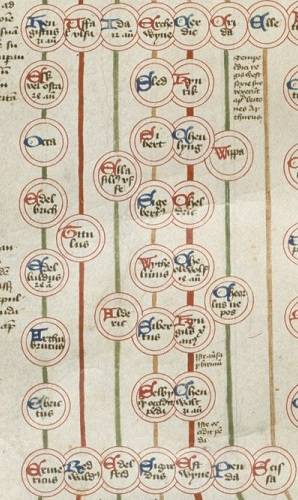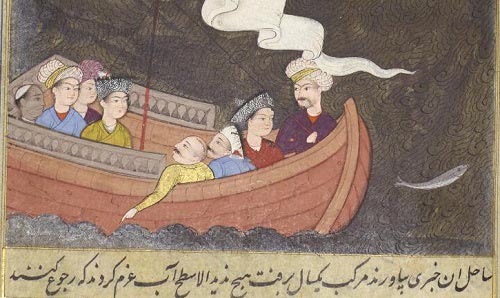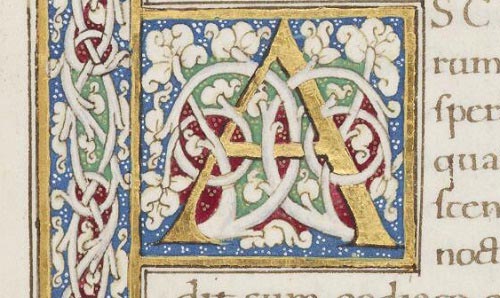
Family, Estate and Charter Collections
The Library holds many significant family and estate archives and collections of charters.

They principally derive from north-west England but most counties in England are represented. They constitute major primary sources for the social, political and economic history of medieval and early-modern England.
The majority of collections derive from Cheshire, including the Arderne of Alvanley, Bromley-Davenport of Capesthorne near Macclesfield, Brooke of Mere, Cornwall-Legh of High Legh, Grey (Stamford) of Dunham Massey, Jodrell of Yeardsley cum Whaley, Legh of Lyme, Leycester of Toft, Mainwaring of Peover, Roundell of Dorfold, Stanley of Alderley, Tatton of Wythenshawe, and Warburton of Arley collections. Lancashire is represented by the Clowes Deeds, Ducie Muniments, Legh of Lyme Muniments and Orford Papers; Derbyshire by the Bagshawe and Crutchley Muniments; and Staffordshire by the Bromley-Davenport, Clowes, Egerton of Tatton, Jodrell and Leycester of Toft collections.
Overview of collections
Typically, the family and estate collections contain deeds and charters; manorial records such extents and court rolls; wills and other testamentary records; leases, rentals and surveys; maps and plans; estate, garden and household accounts, staff lists, wages books, etc.; personal financial records; diaries, commonplace books and correspondence.
The Beaumont Charters and Phillipps Charters formed by 19th-century antiquaries, contain many important medieval documents, including papal bulls, relating to religious houses in France and Belgium. The latter collection also contains several hundred English secular charters. The archive of the Canonesses of the Holy Sepulchre, who took over the temporal possessions of a house of Frères Coquins in Liège, Belgium, includes registers, accounts and deeds relating to the property and finances of the two communities, 13th-18th centuries.
In addition to discrete collections, the miscellaneous Rylands Charters sequence contains several thousand deeds and charters, acquired from various sources. They range in date from c.1130 to the early 20th century. Most counties in England and Wales are represented in the Rylands Charters, with particularly good coverage of Cheshire, Derbyshire, Lancashire and Lincolnshire.
The family, estate and charter collections are major sources not merely for local affairs and genealogy but also for the study of wider social, political and economic history. They are significant for studies of land-ownership, agricultural and landscape history, environmental history, gender studies, continuity and change within the gentry and aristocracy, art history, the history of taste and consumption, the history of religion and personal faith, legal history, diplomatic and the study of seals.
Several collections have wider politico-geographical significance, as sources for political, military, colonial and diplomatic history. The Nicholas Papers, for example, include letters to Sir Edward Nicholas as Secretary of State, 1643-44, and account books of Edward Nicholas as Treasurer and General Receiver, 1694-1715. The Bagshawe Muniments are an important source for British military activities in Ireland and India in the 1740s and ’50s and for the American War of Independence. The Spring-Rice Collection contains valuable comments on the political and economic situation in Britain, on the administration of the Foreign Office, and on affairs in Ireland, India and the United States in the 19th century.
The muniment and charter collections are complemented by the Library’s excellent collection of 18th- and 19th-century published County Histories, works of antiquaries, and the publications of many local record and antiquarian societies.
List of collections
Physical collections
- Arderne Deeds
- Astle Deeds
- Bagshawe Family Muniments
- Beaumont Charters
- Bellot Papers
- Bromley Davenport Muniments
- Brooke of Mere Muniments
- Canonesses of the Holy Sepulchre Archive
- Clowes Deeds
- Copinger-Hartland Manuscripts Collection
- Cornwall-Legh Muniments
- County Histories
- Crutchley Muniments
- Dale Papers
- Ducie Muniments
- Egerton of Tatton Papers
- Finney of Fulshaw Deeds
- Grey (Stamford) of Dunham Massey Papers
- Jodrell Muniments
- Legh of Lyme Muniments
- Leycester of Toft Muniments
- Mainwaring Manuscripts
- Records of the Medici Family of Florence
- Nicholas Papers
- Orford Papers
- Phillipps Charters
- Pluscarden Charters
- Roundell Muniments
- Rylands Charters
- William Arthur Shaw Manuscripts
- Spring-Rice Collection
- Stanley of Alderley Deeds and Papers
- Stapleton Manuscripts
- Tabley Muniments
- Tatton of Wythenshawe Muniments
- Thomson-Byrom Collection
- Warburton of Arley Muniments and Related Collections
- Wickstead Papers
Further information
Related subject pages

Exploring subject areas
An overview of our Special Collections, including information about the background and history of our holdings.

Special Collections A-Z
Explore the Special Collections through the collection names and descriptions using our searchable A-Z tool.
